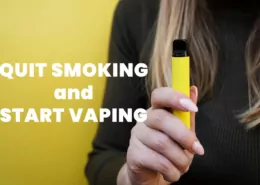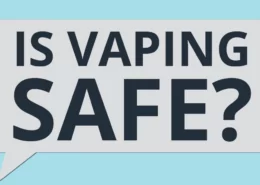Is Vaping Bad for You? (w & w/o Nicotine)
2024 is going to be the year vaping sees major growth and uptake. It’s adoption is already on the increase and it’s quite popular among youngsters. While this is great for avid vapers, the question everyone wants answered happens to be, “is vaping bad for you?” and if so, how bad?
In this post we’re going to share all existing research and findings on vaping and its effects on your health in general. Before we get into it, it is important to understand that there isn’t enough data to conclusively ascertain the benefits or harms of vaping.
Firstly, whether it is bad or not, vaping is considered the most effective method for quitting smoking, and is way ahead of nicotine gums and patches.
So if you’re a smoker, the question whether vaping is bad for you is relative to whether you’re quitting smoking in favor of vaping.
Vaping vs Smoking
Smoking regular cigarettes has several known harmful effects including the inhalation of various carcinogens and killing about six million people every year. Tobacco cigarettes have tons of chemicals that severely affect your lungs and heart coupled with the deposition of tar, which adversely affects your lungs’ ability to function normally.
When it comes to vaping, there are no conclusive studies linking vaping to diseases like cancer or heart conditions.
The only concern with vaping revolves around Formaldehyde, which is a chemical by-product of the breakdown of PG (Propylene Glycol) at high temperatures. However, this is not a practical issue since vapers do not use their vape mods at temperatures high enough for the formation of Formaldehyde, which is a known carcinogen.
Given all this, and the fact that vaping does help smokers abstain, it is clear that vaping is the clear winner and is considerably less harmful than smoking, especially if you’re an existing smoker.
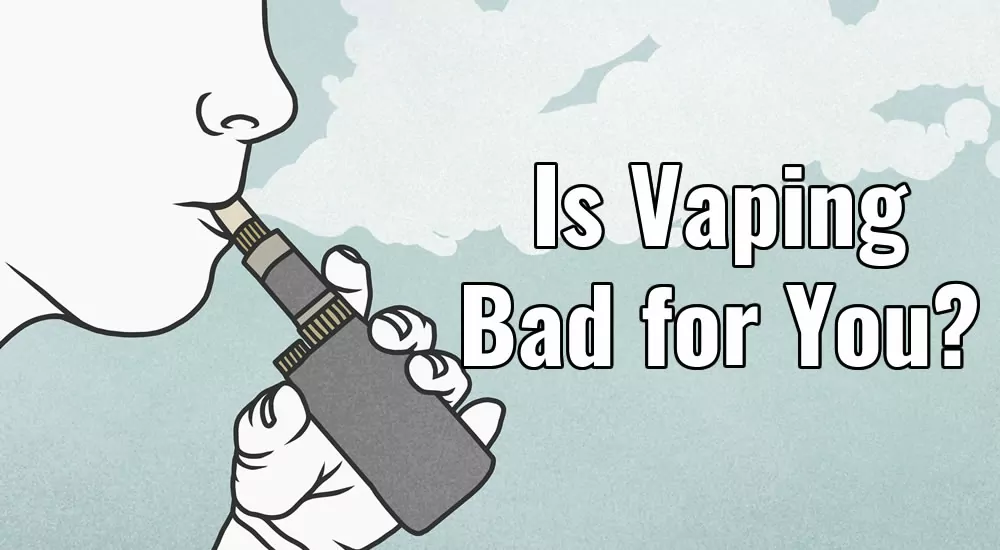
Is Vaping Without Nicotine Bad for You?
Vape juices come in a lot of varieties, with different flavors and nicotine quantities. You can read more in our post on vape juice ingredients. But the availability of 0mg nicotine e-juices raises the question whether vaping without nicotine is bad for you.
First of all, nicotine, which is a very addictive chemical, is not as bad as it is thought to be due to its association with the harmful effects of smoking.
Secondly, if you’re not already a smoker, nicotine is definitely bad for you. It is addictive and is known to case reproductive harm.
However, if you’re vaping e-juice with 0mg nicotine, is it still bad?
The short answer is, “not really”. But that’s not all.
Vaping itself is considered a gateway for non-smokers, so there is always the possibility of non-smokers turning towards a more thrilling tobacco experience.
Then there are concerns about inhaling ultra-fine particulates and aldehydes which are formed when PG is exposed to high temperatures, leading to risk of lung disease and possibly cancer.
PG is also known to have side effects for some people, including but not limited to stomach cramps and dehydration. A good alternate for vapers experiencing issues with PG is VG based e-juice, which is made completely from vegetable material.
Is vaping bad for your lungs?
PG based e-juices are considered more dangerous than purely VG based liquids as PG breakdown at high temperatures can produce aldehydes and fine particulates. According to a study, vaping can lead to inflammation in the lungs.
PG heavy liquids cal also cause coughing and irritation during breathing. The issue here is also the presence of food grade flavorings, which sound like they should be fine, but the truth is that their safety is certified in cases of ingestion, not inhalation.
I’ve personally experienced inflammation in my lungs, coughing, wheezing and excessive mucus production after prolonged vaping sessions with various juices. Some juices cause no issues but others do.
So yes, vaping can be bad for your lungs, with or without nicotine.
Is vaping bad for asthma?
The relationship between vaping and asthma is a little curious. There are a ton of vapers who swear that vaping cured their asthma or made it better and they haven’t gone for the inhaler in a long time.
While there is no actual study to confirm this, there is one by Professor Riccardo Polosa at the University of Catania, and recently published in Discovery Medicine.
According to him, “switching to daily use of electronic cigarettes may ameliorate clinical, functional and therapeutic outcomes for many asthma patients who smoke and that beneficial effects persist in the long-term.”
It is also added that electronic cigarettes can even reverse lung damage caused by tobacco smoking by asthma patients.
Generally, vapers share that VG heavy e-juices can result in symptoms like having trouble breathing and tightening of the chest, which can be problematic for asthma patients. In such cases, using a PG heavy e-juice may help.
While anyone who has asthma should consult a doctor before switching to vaping, smokers who have asthma may actually benefit from vaping.
As for the question whether or not vaping helps asthma, there aren’t many facts, but a lot of people have claimed that it does.
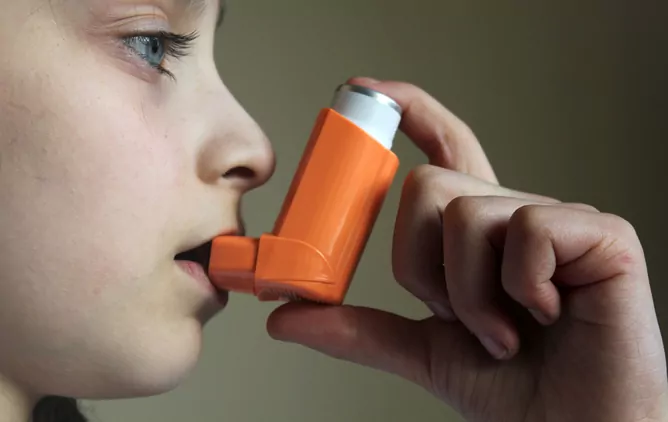
Is vaping bad for your heart?
According to researchers at the European Society of Cardiology Congress, “E-cigarettes are less harmful than traditional cigarettes but they are not harmless. There could be long term heart dangers.They are far more dangerous than people realise.”
The team tested the affect of vaping on the stiffness of the heart’s aorta. A stiff aorta is linked to risk of death by heart diseases and the team found that vaping has an almost similar affect on the aorta’s stiffness as a normal tobacco cigarette.
This essentially means that vaping is bad for the heart, but not necessarily as bad as smoking.
Is vaping bad for your teeth?
Smoking is known to cause oral health issues, ranging all the way from mouth cancer to gum disease, twice the risk of tooth loss and stained teeth.
While vaping reduces the intake of harmful chemicals and tar, using e-juices with nicotine still puts your oral health at risk.
Nicotine constricts your veins, reducing blood flow, which can adversely affect your gums, even leading to the death of gum tissue. This is a serious condition and nicotine usage in this way can lead to conditions periodontitis and gingivitis.
The intake of nicotine is also linked to fired up muscles, which can, in a lot of cases, lead to grinding of teeth. It can also dry up saliva production in your mouth, which is again harmful for your teeth.
However, vaping without nicotine should resolve these issues and not be that bad for your teeth, especially when compared to smoking cigarettes and vaping with nicotine.
Vaping and bad breath?
While vapes come in so many flavors, vaping can lead to bad breath in certain cases, especially as a by product of the harmful effects of nicotine.
Nicotine can lead to poor oxygen supply to your gum tissues, which can lead to gum diseases and essentially bad breath. The same is the case with the reduction in saliva production, which leaves your mouth dry and encourages bacteria growth, which once again leads to bad breath.
Vaping without nicotine can also cause bad breath because vape juice dehydrates you and dries your mouth.
A good way around this is to keep a bottle of water handy and take regular sips to prevent dehydration due to vaping.
Common Side Effects of Vaping (PG Side Effects)
A lot of people who start vaping to quit smoking experience and complain about side effects such as bleeding gums, increased coughing, dizziness, dry throat, insomnia and constipation.
It is important to understand that a lot of these are side effects of quitting smoking rather than taking up vaping, and may take anywhere from 3 to 6 weeks to subside.
However, there are some actual side effects of vaping including:
- Dry mouth
- Dry, irritable skin
- Itching
- Increased mucus production
- Coughing/chest tightening
- Blood nose issues
- Bloating and puffiness
- Constipation
These side effects are due to different reasons but usually subside after a few weeks of vaping.
The main culprit here is PG or Propylene Glycol, which is hygroscopic (moisture absorbing) and also allergic for some people.
It sucks the moisture from your mouth, leaving it dry and can also cause inflammation in lungs (and increased mucus production), especially if you are vaping at very high temperatures.
The bloating, puffiness and blood nose issues are also linked with dehydration and drying of the nasal passage and the dry skin and itching are due to PG allergies.
Constipation is another side effect that is linked to giving up smoking and nicotine, but dehydration can also lead to constipation and hard stool.
You can get around all these issues by increasing your water intake and switching from PG to VG based e-juices and vaping at lower temperatures.
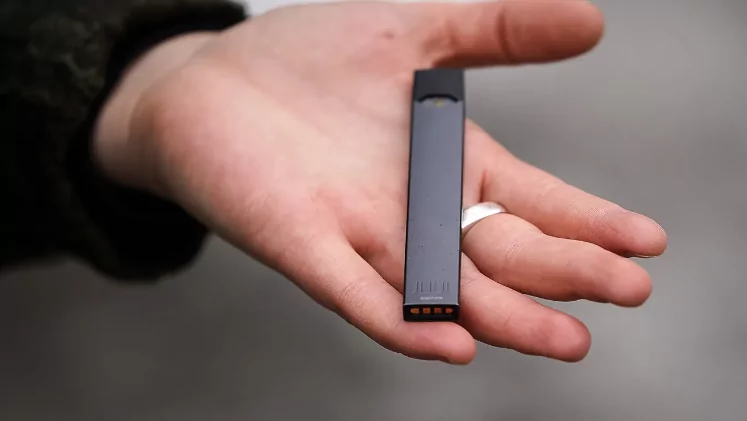
Is Second Hand Vaping Bad?
Second hand smoke from cigarettes is known to be a major concern, and the same concerns have been raised about vaping, especially in public areas and around kids.
What people want to know is whether second hand vaping is bad and has any side effects for non-vapers.
According to a study, “the current state of knowledge about chemistry of liquids and aerosols associated with electronic cigarettes indicates that there is no evidence that vaping produces inhalable exposures to contaminants of the aerosol that would warrant health concerns by the standards that are used to ensure safety of workplaces.”
Another study published in the Nicotine & Tobacco Research journal suggests that second hand vaping is a non-issue and vaping should not be banned outdoors.
It says, “There is a large body of evidence suggesting that e-cigarettes are relatively harmless to the people who use them, making claims about the dangers of second-hand exposure even more spurious — especially in well-ventilated outdoor spaces where people can easily move away from someone using the product.”
There are however concerns of nicotine exposure in closed spaces.
Even though nicotine emission from vaping is considered to be 1/10 of emission during smoking cigarettes, it is a concern that extended sessions of vaping without ventilation will expose non-vapers to traces of nicotine.
Is vaping Bad for Your Health?
Finally, the big question. Is vaping bad for your health? If you’ve read everything above, you’ll know that the answer to this isn’t straight forward.
Vaping is definitely a better alternative to smoking cigarettes.
But since cigarettes are actually the most harmful consumer product sold, being better than them is not exactly a compliment.
Vaping with e-juices that contain nicotine is definitely more harmful than vaping without nicotine. Nicotine is addictive and is known to cause several oral health issues and overdose of nicotine is a very real concern with vapers because of increasing nicotine quantities in e-juices.
Then you have the problem of inadequate testing, research and identification of any issues vaping may cause. There is not enough regulation surrounding the manufacturing of vaping equipment and juices, which exposes vapers to health dangers.
Lung inflammation, PG allergies, dehydration and aorta stiffness are also real concerns and vapers can also subject others around them to nicotine if they vape in closed environments for long periods.
If we were to reach a conclusion on how bad vaping really is, it would result in two main points.
- Vaping is bad for your health if you are not already a smoker and have never vaped before. Even if you vape without nicotine, it is not something you should pick up if you’re not into it already. There is not enough research to give non-nicotine vaping a clean chit, and you will still suffer from the side effects of PG and vaping in general.
- If you’re an existing smoker, vaping is definitely the better alternative and you should switch to vaping and lower your nicotine intake slowly. With dedication, you are likely to end up quitting smoking, and while there are health dangers associated with vaping, they are significantly less when compared to tobacco smoking.
We hope this post answers most of your questions regarding the side effects of vaping and whether vaping is bad for you and your health. If you have any questions or concerns regarding vaping, drop a line in the comments below!
- Russia’s Vape Market: Inside the Battle for Control - August 8, 2025
- Brazil: Paraná Bill to Add Vaping to “No Smoking” Signs - August 8, 2025
- Celebrate with EightVape: 10 Lucky Winners Get Free Orders or $100 Gift Cards - August 8, 2025

